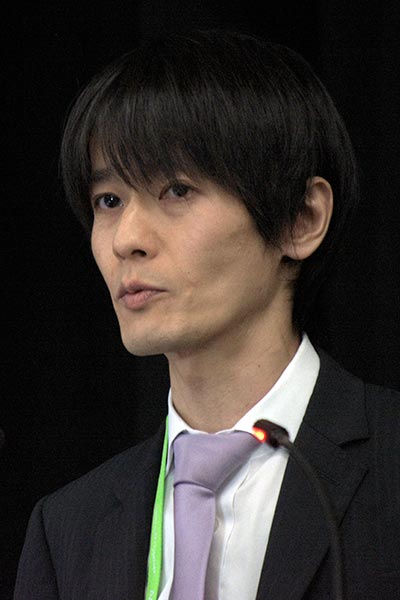AACR-JCA joint session reviews advances in treatments and immunotherapies in gastroesophageal cancers
//
Estimated Read Time:
Recent clinical advances, new and emerging molecular drivers, and evolving therapeutic strategies for gastroesophageal cancers (GECs) were the focus of the American Association for Cancer Research (AACR)-Japanese Cancer Association (JCA) joint session on April 8 at the AACR Annual Meeting 2024 in San Diego.
GECs are a major cause of cancer-related mortality worldwide. Gastric cancer risk and incidence varies globally, with the highest risk in some South American, Eastern European, and East Asian populations, including people in Japan and China. Although gastric cancer incidence and mortality have been declining, especially in developed countries, incidence in younger individuals (<50 years) has shown an increasing trend, including in the United States.

The AACR-JCA joint session was co-chaired by Tatsuhiro Shibata, MD, PhD, professor at the University of Tokyo and head of the Division of Cancer Genomics at the National Cancer Center Research Institute in Japan, and Elena Elimova, MD, MSc, assistant professor at the University of Toronto and medical oncologist at the UHN Princess Margaret Cancer Centre.
Elimova said, “This is a very exciting time to treat gastroesophageal cancer. We have a much better understanding of molecular drivers in this disease, and this has led to a number of targeted therapies, which we will be talking about today—including claudin (CLDN) 18.2, FGFR2b, HER2—and of course, immunotherapy.”
The session is available on demand for registered AACR Annual Meeting 2024 attendees through July 10, 2024, on the virtual meeting platform.
Large-scale genomic analyses of gastric cancer
Shibata presented recent data on the driver gene landscape in a large dataset of over 1,400 gastric cancer patients, including those of East Asian and Eastern European ancestry. He showed that hypermutated, intestinal type, and diffuse type gastric cancers had different genomic profiles—in terms of ploidy, copy number changes, and frequency of point mutations; further, the frequency of driver gene mutations differed by ancestry.
Shibata also discussed sequencing data for gastric cancer whole genomes, which helped identify around 50,000 structural rearrangements, including the production of extrachromosomal DNAs.
Shibata and colleagues identified FGFR2, ERBB2, and CCNE1 as genes frequently amplified on extrachromosomal DNA that may serve as potential drug targets.
“Our analysis also suggested that these molecules are important for gastric carcinogenesis and that very unique genetic alterations or structural patterns are associated with these important oncogenes,” Shibata said.
HER2-targeted therapy in gastric cancer

Yelena Janjigian, MD, medical oncologist at Memorial Sloan Kettering Cancer Center, reviewed the role of HER2 as a target of therapy in gastric cancer. While the HER2-targeting antibody trastuzumab, in combination with chemotherapy, has been approved for use in gastric cancer for over a decade, the response duration is typically short, Janjigian said.
Janjigian demonstrated that co-occurring alterations in other signaling pathways in HER2-positive gastroesophageal junction (GEJ) cancers can drive intrinsic resistance to anti-HER2 therapies. She also discussed the heterogeneity of HER2 expression in gastric cancer, which can be monitored using HER2 positron emission tomography (PET) imaging, as an additional barrier to HER2-targeting therapies. For these reasons, it is important to pursue strategies beyond basing HER2 targeting, like combination therapies. She reviewed the preclinical rationale and clinical data that led to approval by the U.S. Food and Drug Administration for pembrolizumab plus the anti-HER2 agent trastuzumab and chemotherapy for HER2-positive gastric cancer.
To best direct future combination therapies, Janjigian stressed the importance of monitoring for other therapeutic vulnerabilities. “We need to continue to test biomarkers at baseline and often,” she said. “The future [goal] is really to be able to do more in-depth sequencing efforts in these phase III studies as well.”
New and emerging therapeutic targets in gastric cancer

Kohei Shitara, MD, chief of the Department of Gastrointestinal Oncology at the National Cancer Center Hospital East in Japan, reviewed data supporting FGFR2, claudin 18.2 (CLDN18.2), and other proteins as potential therapeutic targets in gastric cancer.
Shitara explored key oncogenic alterations in gastric cancer, including mutations in receptor tyrosine kinases (RTKs), and clinical studies of therapies targeting these drivers. He said, “RTK abnormalities, mainly gene amplification, are one of the major [genomic] characteristics of gastroesophageal adenocarcinomas, based on chromosomal instabilities.”
He reviewed clinical data for several RTK-targeted therapies, including those targeting FGFR2. He touched on the use of small molecule inhibitors of FGFR2, such as futibatinib and infigratinib, as well as an anti-FGFR2b monoclonal antibody, bemarituzumab, in this disease setting.
Shitara then discussed the role of CLDN18.2, a non-oncogenic target for gastric cancer therapy. The CLDN family is comprised of membrane proteins present in tight junctions. One of the CLDN 18 isoforms, CLDN18.2, is highly expressed in stomach mucosa, but the CLDN-containing junctions are not typically exposed to the extracellular lumen unless tissue architecture is disrupted, like in cancer. This makes it an attractive drug target, Shitara noted.
“At least four types of agents [targeting CLDN18.2] have been tested in clinical trials, including monoclonal antibodies, bispecific T-cell engagers, CAR T-cell therapy, and ADC [antibody-drug conjugate] agents,” he said.
Shitara discussed clinical trial data for zolbetuximab, an anti-CLDN18.2 monoclonal antibody, in CLDN18.2-positive advanced gastric cancer. He showed that zolbetuximab improved overall survival when added to the standard-of-care first-line therapy. He also briefly touched on several studies testing other investigational CLDN18.2-targeting therapies, including CAR T cells, bispecific T-cell engagers, and ADCs.
Immunotherapy and biomarkers that predict response
Elimova’s presentation focused on predictive biomarkers for GEC immunotherapy. She said, “We have been using immunotherapy [to treat gastric cancer] over the last 10 years, either in trials or in clinical practice, so we have learned a lot. But I agree with Dr. Jinjigian that there remains a lot to be learned.”
Elimova reviewed data for clinical studies of perioperative and adjuvant immunotherapy in GEC, alone or in combination with docetaxel, oxaliplatin, leucovorin, and 5-fluorouracil (FLOT). While these regimens showed clinical benefit, they were most effective against tumors with PD-L1 expression or high microsatellite instability (MSI-H).
Elimova showed similar patterns in the neoadjuvant and metastatic settings, with PD-L1 and MSI-H consistently emerging as the strongest predictors of response. For patients whose tumors lack these biomarkers, researchers are assessing the potential benefits of combining immune checkpoint inhibitors that block different targets, or incorporating immunotherapy with other therapies targeting CLDN18.2, HER2, and FGFR2 for treating GEC.
“I think the question that is in front of us as medical oncologists now is: How should we prioritize biomarker-based therapy in the setting of multiple agents that we’re now using?” Elimova said.




